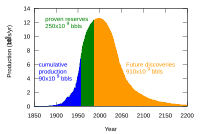
Photo from wikipedia
Economic growth, urbanization, and financial market development (FMD) may increase energy demand in any economy. Non-renewable sources of energy consumption, i.e., oil consumption and natural gas consumption (NGC), could have… Click to show full abstract
Economic growth, urbanization, and financial market development (FMD) may increase energy demand in any economy. Non-renewable sources of energy consumption, i.e., oil consumption and natural gas consumption (NGC), could have environmental consequences. We examine the effects of economic growth, urbanization, and FMD on the oil consumption and NGC in Middle East countries using the period 1975–2019. In the panel results, we found a positive effect of income and a negative effect of income-squared on oil and natural gas consumption. Hence, we corroborate the existence of the environmental Kuznets curve (EKC) hypothesis in oil and natural gas consumption models of the Middle East region. Urbanization has a positive effect on oil and natural gas consumption. FMD has a positive effect on oil consumption and has a negative effect on NGC. From the long-run, country-specific results, we validate the existence of the EKC hypothesis in the oil consumption models of Iran and Iraq. The EKC is also found in the natural gas consumption models of Iran, Kuwait, and the UAE. From the short-run results, the EKC hypothesis is validated in the oil consumption models of Iran, Iraq, and Israel. The EKC is also corroborated in the NGC models of Iran, Kuwait, and the UAE. In the long run, urbanization has a positive effect on oil consumption in Iraq, Kuwait, Saudi Arabia, and Qatar. Further, urbanization has a positive effect on the NGC in Iraq, Israel, and Saudi Arabia. Conversely, urbanization has a negative effect on oil consumption in Israel. In the short run, urbanization has a positive effect on oil consumption in Iraq, Israel, Kuwait, and Qatar. Moreover, urbanization has a positive effect on the NGC in Iraq. On the other hand, urbanization has a negative effect on oil consumption in Saudi Arabia and Iran. In the long run, FMD has a positive effect on oil consumption in Saudi Arabia and Israel. In the short run, FMD has a positive effect on oil consumption in Israel, Kuwait, and Saudi Arabia. In contrast, FMD has a negative effect on oil consumption in the UAE. Moreover, a positive effect of FMD on NGC is found in the UAE. However, FMD has a negative effect on the NGC in Israel.
Journal Title: Energies
Year Published: 2021
Link to full text (if available)
Share on Social Media: Sign Up to like & get
recommendations!